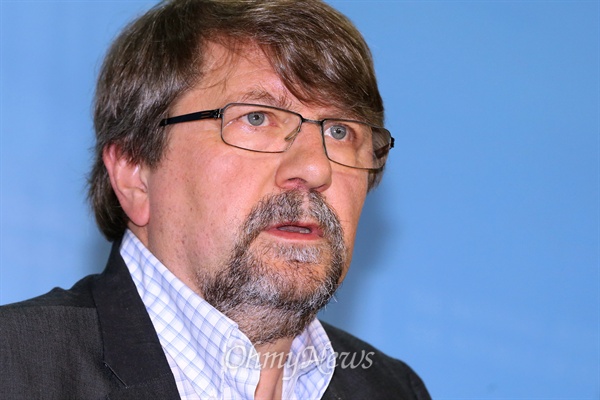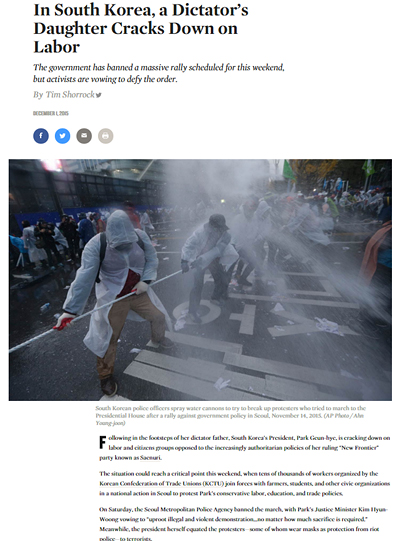| 정부가 박근혜 대통령을 비판한 미 주간지에 외압을 행사했다는 주장이 나와, 파문이 일고 있다. 팀 샤록(Tim Shorrock) 기자는 지난 2일 <더 네이션>에 1차 민중총궐기 당시 경찰의 강경 진압을 비판하는 기사를 썼다. 이후 미국 뉴욕 총영사관은 <더 네이션>에 항의했다. 이후 외압 논란이 확산되자 외교통상부는 외압이 아니라고 해명했지만, 샤록 기자는 <오마이뉴스>에 보낸 기고문에서 "박 대통령에 대해 우호적 기사를 쓰도록 하려는 일종의 겁박이었다"라고 밝혔다. 다음은 기고문 전문(번역본과 원문)이다. [편집자말] |

▲팀 샤록 기자(자료사진). ⓒ 남소연
지난주 뉴욕의 한국 총영사관이 내가 <더 네이션>에 기고한 박근혜 대통령의 노동운동 탄압에 대한 기사와 관련해 그 잡지의 편집자들과 접촉하려 했다는 소식을 들었다. 그 소식에 놀랐고, 적잖이 충격을 받았다. 나는 30년 이상, <더 네이션>을 비롯한 많은 미국 간행물에 한국에 대한 기사를 써왔다. 그러나 뉴욕 총영사관의 접촉 이전까지는, 내가 쓴 보도기사에 대해 한국 정부로부터 직접 항의받은 일은 단 한 차례도 없었다. 사정이 이러하니, <더 네이션> 기사에 한국 정부가 주목한 이유가 궁금해졌다.
내가 정보를 취합해 본 결과, 뉴욕 영사관 사람은 서울의 상부 명령을 받고, <더 네이션>의 편집자들을 접촉했다는 것이다. 또한, 그 영사관 직원은 내 기고문의 한국어 번역본이 인터넷에 올라와 많은 사람이 읽고 많은 댓글이 올라온 후에야, <더 네이션>과 접촉했다는 것이다. 분명한 점은 박근혜 정부에 매우 비판적이고 그녀의 아버지 박정희 전 대통령에 대한 자세한 사실을 많이 내포한 내 기사가 외교통상부 누군가의 심기를 심하게 건드렸다는 것이고, 외교통상부는 영사관에 <더 네이션>에 항의하도록 지시했다는 것이다.
박 대통령을 "독재자의 딸"로 지칭한 사실을 제외한다면, 내 기사의 내용은 새롭지도 특별하지도 않았다. 한국 정부가 그 기사에 주목한 이유는, 그 내용이 대부분의 한국 관련 미국 언론 보도와는 사뭇 달랐기 때문일 것이라는 게 내 생각이다. 대부분의 경우, 한국 주재 미국 기자들은 한국을 냉전의 관점에서 바라본다. '나쁜' 북한 사람들은 악인이며, '착한' 남한 사람들은 언제나 악인의 피해자라는 것이다. 물론, 그들은 변함없이 미국을 '착한' 남한의 궁극적 수호자라고 바라본다.
| 팀 샤록은 누구? |
| 미국 탐사전문기자인 팀 샤록은 1996년 5·18 광주민주화운동 관련 미국 국무부의 비밀 해제 문건, 이른바 '체로키(Cherokee) 파일'을 입수해 폭로했다. 카터 대통령의 한국 담당 비밀대책팀과 전두환 신군부 사이에 오간 비밀 전문이 담겨 있는 이 파일을 통해 미국의 광주민주화운동 개입 전략을 최초로 세상에 알렸다. 샤록은 지난 5월 광주명예시민증을 받았다. 그는 선교사인 아버지를 따라 서울에 살면서 1960년 4·19 혁명을 목격했다. 미국 오리건대학교 대학원에서 미국과 한국의 관계, 한국의 노동운동을 연구했고, 그 뒤 여러 차례 한국을 찾았다. |
이러한 틀이 남한의 복잡한 사정(정치경제 체제, 대미관계)을 이해하기 어렵게 만드는 것은 불행한 일이다. 결국 남한이 수십 년 동안 민주적 권리를 억압받았음을, 미국의 지지를 받은 독재자들에게 지배 받았다는 사실을 미국인들은 거의 모른다.
한국 사회에는 독재 유산에 대한 심각한 의견 대립이 있다. 많은 남한 국민들이 박근혜 대통령과 그녀의 전임자 이명박 대통령의 보수적 정책에 반대해 왔다. 그러나 이 사실 역시 미국인들은 더더욱 모른다.
이 지경이니, 박근혜 대통령과 이명박 대통령을 민주주의 수호자요, 미국의 중요한 군사 파트너라고 미국 역사상 가장 리버럴한 대통령 오바마가 칭송한다 한들, 미국인들이 별달리 생각하겠는가?
따라서 영사관이 <더 네이션>을 접촉한 후 처음 든 생각은, 미국 저널리스트 한 사람이 한국에 대한 비호감을 보이자 남한 정부가 흥분했다는 것이었다. 내 편집자들에게 전화를 걸어 내 기사에 대해 불평하는 것은 <더 네이션>과 내가 박 대통령에 대해 우호적 기사를 쓰도록 하려는 일종의 겁박이었다. 나는 화가 났다. 그래서 영사관에서 한 말을 내 페이스북 페이지에 올렸다. 물론 그것이 한국 언론에 크게 보도되리라는 것을 모른 채 말이다.

▲팀 샤록이 <더 네이션>에 기고한 글 '독재자의 딸, 노동자를 탄압하다'. ⓒ 더 네이션
나는 한국 정부가 내 기사를 "올바르게" 하려는 시도에 반대한다. 물론, 한국 영사관이 <더 네이션>에 한 말 중 한 대목은 동의할 수밖에 없다. 한국이 지난 30년간 엄청난 변화를 겪었다는 대목 말이다. 그 말은 사실이고, 반대할 수는 없다.
나는 이승만 전 대통령 치하의 한국에 살았고, 이 전 대통령이 타도되는 것을 목격했다. 그 후 1980년대 한국에 수개월 머물면서 한국의 민주화 운동에 대해 집필했고, 노동조직가, 종교 활동가, 정치 조직가들을 만나 그들의 경험과 희망에 대해 경청했다. 1980년대 마지막 방문은 1985년이었다. 내가 오늘 만났던 사람이 다음날 체포됐다는 소식을 들을 정도로, 당시 상황은 몹시 어려웠다. 광주도 가봤는데, 그 도시의 봉기에서 무슨 일이 있었고 봉기가 진압된 후 무슨 일이 벌어졌는지에 대해서도 많이 알게 됐다.
그 후 오랫동안 나는 한국에 가지 않았다. 그러나 워싱턴에서 한국에 대해 계속 보도한 1990년대 내내, 그리고 2001년, 2013년, 2015년 방문을 통해 한국이 독재의 암흑기로부터 얼마나 많이 변했는지 잘 알고 있다. 물론 많은 한국인에게 아직 상황이 매우 좋지는 않다는 것도 알고 있다. 특히 평범한 노동자, 농민, 도시 빈민들의 처지가 좋지 않다는 것을 알고 있다. 그러나 한국이 1970~1980년대 독재 시절에 비하면 완전히 바뀌었다는 것도 알고 있다. 많은 한국인이 걱정하는 것처럼, 나도 박근혜 대통령 치하의 한국이 다시 과거로 미끄러져 내려갈 것 같아 걱정이다. 한국 정부는 내 기사에 신경질적으로 반응하기보다, 비판을 환영하고 세계의 비판에 괘념치 않는다는 것을 보여줬어야 했다.
<더 네이션>의 보도를 향한 박근혜 정부의 비판에, 한국의 야당과 <한겨레> 등 다른 매체들이 비판으로 맞서준 데 사의를 표하고 싶다. 연대를 보여줘 감사하다. 이들은 한국이 독재 회귀를 허용치 않겠다는 결의를 보여줬고, 한국의 민주주의가 여전히 활발하다는 것을 증명해줬다.
마지막으로, 한국인이 지난 50여 년간 민주주의를 건설하면서 이룬 업적에 대해 내가 엄청난 경외감을 갖고 있다는 것을 <오마이뉴스> 독자들이 알아줬으면 한다. 또한, 오바마 행정부의 비민주적 정책(특히, 국가안보국(NSA)의 광범위한 민간인 사찰과 내부고발자 탄압)에 대해 내가 매우 비판적이라는 점도 알아줬으면 감사하겠다.
지난 5월, 나는 광주광역시의 명예시민으로 위촉됐다. 한국과 미국, 양국 모두의 시민이 된 셈이다. 두 개의 내 나라, 미국과 한국의 잘못된 점을 지적하는 것은 시민이자 저널리스트인 나의 의무이다. 어떠한 정부라도 진실을 두려워해서는 안 된다.
2015년 12월 8월 워싱턴DC에서
팀 샤록
THE CONSULATE-GENERAL AND THE NATION: MY EXPERIENCE IN KOREA AS A JOURNALIST By Tim Shorrock For OhMyNews When I heard last week that the South Korean Consulate in New York had contacted my editors at The Nation about my article on President Park Guen-Hey's crackdown on the labor movement, I was surprised and a little shocked. I've been writing about South Korea for over 30 years for the Nation and other US publications. But until this call, I'd never heard a direct complaint about my article from the Korean government. So I wondered: why did this article catch their attention? From what I've been able to piece together, the person at the Consulate contacted my editors on direction from his boss in Seoul. But he wasn't contacted until after my article had been translated into Korean and posted on the Internet, drawing thousands of readers and comments. My article, which was quite critical of the Park government and included many details about her dictator father, Park Chung Hee, apparently deeply offended someone inside Park's foreign ministry, which then instructed the Consulate to complain to the Nation. Aside from the fact that I refered to "a dictator's daughter," however, there was little in my article that was new or unusual. I believe that it caught the government's attention because it was so unlike most reports about South Korea in the U.S. press. For the most part, American reporters in Korea see the country only in Cold War terms, with the "bad" North Koreans always the villains and the "good" South Koreans always the victim of those villains. And of course they consistently see the United States as the ultimate champion of "good" South Korea. Unfortunately, this framework obscures the complexities of South Korea, its political and economic system, and its ties to the United States. As a result, few Americans know that South Korea was ruled by many years by tough dictators who were supported by the United States despite their suppression of democratic rights. Fewer still are aware of the deep divisions within South Korea over this legacy and that the fact that many Koreans are opposed to the conservative policies of Park Guen-Hye and her predecessor, Lee Myung-bak. Why would Americans think any differently when President Obama, America's most liberal president, praises Park and Lee as champions of democracy and important military partners? Therefore, my primary thought after the Consulate contacted the Nation was that the Korean government was upset that an American journalist was putting their country in an unfavorable light. Calling my editors and complaining about my article seemed to be a form of intimidation to pressure the Nation and myself to report more favorably about President Park. It angered me, and so I posted what they'd said on my Facebook page – not knowing of course that it would be picked up as a major story by the Korean media. So I disagree with the government's attempt to "correct" my reporting. At the same time, I found myself agreeing with something the Consulate told the Nation. He said that we should understand that South Korea has undergone tremendous change over the past 30 years. That is true, and I can't disagree. I lived in South Korea during the era of Syngman Rhee and witnessed his overthrow. And later, during the 1980s, I spend many months in South Korea writing about the citizens' movement for democracy and meeting with labor organizers, religious activists and political organizers about their experiences and hopes for the future. On my last trip, in 1985, conditions were very difficult, and sometimes I would meet someone one day and learn they had been arrested the next. I also visited Kwangju, and learned much about what happened in that city during the uprising and afterwards. After that visit, I didn't return to South Korea for many years. But in reporting from Washington in the 19990s and in my visits in 2001, 2013 and 2015, I understood how much South Korea has changed since the dark days of dictatorship. I know that conditions are still bad for many people, particularly ordinary workers, farmers and the urban poor. But I also know that South Korea today is nothing like the authoritarian days of the 1970s and 1980s. My worry, along with many Koreans, is that under Park South Korea may be slipping back into the old ways. Instead of reacting angrily, the Korean government should welcome that critique and show the world that it is unafraid of criticism. To the opposition party, Hankyoreh and other publications that have criticized the Park government for criticizing the Nation – thank you for your solidarity! You are showing that democracy is still vital and that you have no intention of allowing South Korea to slip back into dictatorship. Lastly, I want OhMyNews readers to know that I have tremendous respect for what South Koreans have accomplished in building that democracy over the past 50 years. You should also know that I am extremely critical of my own government and the Obama administration for its undemocratic policies, particularly the widepread surveillance of U.S. citizens by the National Security Agency and its attacks on whistleblowers who try to expose these wrongdoings. Last May I was made an honorary citizen of the City of Kwangju. So I feel like I'm a citizen of both Korea and the United States – and as a citizen and a journaliist, it's my duty to shed light on what's wrong with both of our countries and seek ways to make us better. No government should be afraid of the truth. Tim Shorrock Washington DC December 8, 2015.